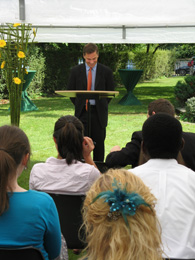
The last week of the Summer University at ECLA was dedicated to roundtable discussions which provided an effective concluding section of the programme by presenting case studies and in depth theoretical analyses on the following topics: “Terrorism and State”, “Terrorism and Religion”, and “Terrorism and Ethnicity”. Led by David Durst, Theodor Paleologu, and Bartholomew Ryan, respectively, the three discussion panels allowed students to discuss issues such as the impact of the mass media on the average citizen of a country fighting the war on terror, the crusades as the origin of religious terrorism, or if the Provisional IRA’s cause was justified or not. It was also an excellent end to a fascinating course as it provided everyone with the opportunity to join the discussion that most appealed to them, and speak their mind on contemporary issues that they found particularly relevant to the topic.
Perhaps the most anticipated event of the week was the Closing Celebration which was held on Friday, the 24th of August. After a warm welcome address and best wishes for our future endeavours from Laurent Boetsch (General Manager of ECLA), it was David Durst’s turn to acknowledge the extensive efforts of faculty, staff and students alike, and to award special diplomas, most of them referencing characters from the ISU’s main text, Dostoevsky’s Demons. Laughter predictably ensued as both professors and students were given awards such as the Stavrogin Award for Seduction (Bartholomew Ryan), the Lyamshin Award for Photography (Gabriel Boc, Romania), or the Pyotr Verkhovensky Award for Supreme Agitator (Bas Voorwinde, Netherlands). After this, our very own soon-to-be-ridiculously-famous opera singers, Julia Klotz (Germany) and Olena Androsiuk (Ukraine) thrilled the audience with their playful rendition of Despina’s aria from “Cosi fan tutte” by Mozart (Julia) and powerful performance of “Cavatina” from “Anna Bolena” by Donizetti (Olena).
Then it was time to receive the final recognition for six weeks of hard work – the graduation certificates. As each of us went up to collect much more than a piece of paper – applause, enthusiasm and encouragement followed, but the realisation that a beautiful time was coming to an end began to sink in. The ISU choir put a smile on everyone’s faces by musically claiming that “ECLA is a wonderful place”. We all could not agree more.
One of the things I constantly heard during the last few days at ECLA was “I hate goodbyes”. For most of us, it is difficult to deal with the letting go and moving on. But why does such a feeling emerge? Is it because we grow so attached to our environment that we think of it as home? Is it because of the friends we make along the way and who we will miss terribly? Or is it because we find ourselves in a comfort zone where our educational and personal needs are satisfied to such an astonishing extent? Another series of questions inevitably arises: Could our lives become permanent versions of the International Summer University? Is it possible to transform our existences into eternal recurrences of those six weeks? The answer to the latter is “No”. What we experience here is merely a drop in the ocean, a taste of what we can achieve, a glimpse into a kaleidoscope of possibilities. We cannot be “heroes, forever and ever”, even though David Bowie might want to argue differently. But during six weeks we ruled over Pankow, Berlin, and, most importantly, ourselves. The best is yet to come.
By Catalina Iorga (ISU ’07, Romania)
